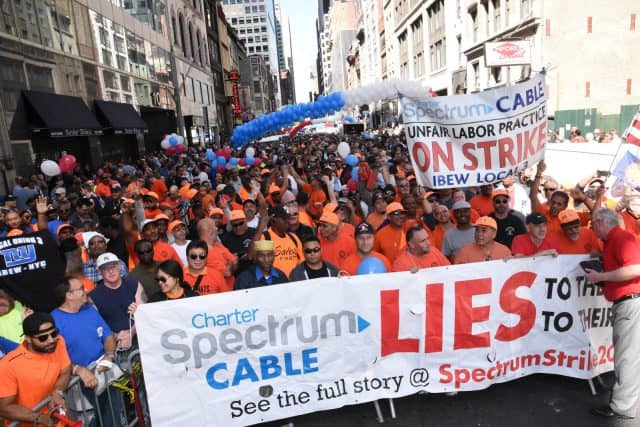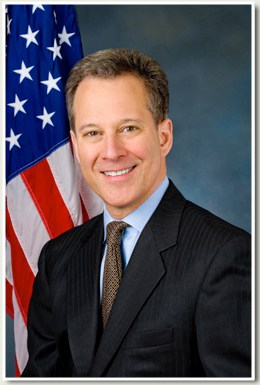
Spectrum workers on strike march in the 2017 Labor Day parade in New York City. (Image courtesy: IBEW/Local 3)
Charter Communications’ list of addresses of some of its “locally based contractors” turned out to be self-storage locations, leading to accusations the company could potentially be in default of its franchise agreement with New York City.
Charter agreed to use city-based contractors wherever possible to maintain and upgrade its expansive cable system in the Big Apple. But an audit by the Department of Information Technology and Telecommunications found only seven of 26 vendors Charter uses are in the city, despite claims by Charter that 77% of its vendors are NYC-based.
On its own, the violation might seem minor, except for the fact Charter Communications has left 1,800 of its best-trained workers in New York and New Jersey out on strike for 11 months, the longest unresolved labor action of 2017.
Workers’ demands, presented by the International Brotherhood of Electrical Workers (IBEW) Local 3, have been largely ignored by Charter, in part because the company can find replacement workers outside of the area.
Charter’s denial of the accusation it was in violation of its agreement to use local labor included an attempt to broaden the definition of “located,” followed by an effort to change the subject to what the company alleges are more than 100 acts of vandalism committed by striking workers or those sympathizing with them.
“We continue to meet our franchise obligations, and our response to their findings is included in the report,” a Charter spokesman told the New York Daily News over the weekend.
Although union resources supporting the striking workers have been tested to their limits, the union and most of its members persevere. But it remains a difficult struggle, with some members on the verge of losing their apartments, and many more now relying on food banks and public assistance.
The dispute began after the former Time Warner Cable employees were transitioned to Charter Communications. Charter announced it wanted to pull out of the union’s pension and healthcare plans and replace them with a company-sponsored healthcare offer and a 401(k) retirement plan.
 “They basically said that until we agree that they don’t have to contribute to our pension and health plan, they won’t talk about anything else,” Chris Erikson, business manager of Local 3, told the Daily News last fall. “That’s a gun to our head, they said ‘Take it or leave it.’ And our membership understands the value of what’s at stake here, and they decided to leave it.”
“They basically said that until we agree that they don’t have to contribute to our pension and health plan, they won’t talk about anything else,” Chris Erikson, business manager of Local 3, told the Daily News last fall. “That’s a gun to our head, they said ‘Take it or leave it.’ And our membership understands the value of what’s at stake here, and they decided to leave it.”
Efforts by large corporations to abandon employee care and retirement plans administered by the unions themselves is part of a broader national attack to make unions irrelevant, argue union defenders. The replacement plans offered by Charter are greatly reduced from what Local 3 fought for and won from Time Warner Cable.
“The practical side of the medical plan that the members have is: my son had a kidney transplant and I got the bill from Columbia Presbyterian hospital and it was $96,000. My share of that was 200 bucks. If I was in Charter’s medical plan I’d probably have to take a loan to pay the hospital bill – that’s with coverage,” Erikson told The Guardian.
Charter can certainly afford to cover its workers’ needs. The company’s CEO was the highest paid in the country in 2016, earning $98 million. The impact of the Trump tax cuts also delivered soaring profits for Charter Communications as a whole.
Profits for the fourth quarter of 2017 hit $9.6 billion, compared with $454 million during the same period in 2016. Profits for the year reached $9.9 billion, compared with $3.5 billion in 2016. Charter earned $41.6 billion in revenue in 2017.
New York Mayor Bill de Blasio thinks the strike has gone on for too long.
“It’s been almost a year that Local 3 workers have been on strike. It’s far past time for management to come to the table with a fair deal,” he said.


 Subscribe
Subscribe The Trump Administration is
The Trump Administration is 

 Sinclair Broadcast Group has told the Federal Communications Commission it is willing to sell two well-recognized TV stations in Chicago and New York owned by Tribune Media if it will help win approval of its $3.9 billion acquisition of Tribune-owned stations by the Justice Department and FCC.
Sinclair Broadcast Group has told the Federal Communications Commission it is willing to sell two well-recognized TV stations in Chicago and New York owned by Tribune Media if it will help win approval of its $3.9 billion acquisition of Tribune-owned stations by the Justice Department and FCC. The filing is effectively a new application because it fundamentally changes the structure of the deal and its impact on several TV markets where Sinclair could own multiple stations in a single city.
The filing is effectively a new application because it fundamentally changes the structure of the deal and its impact on several TV markets where Sinclair could own multiple stations in a single city. Charter Communications will have to face a courtroom to answer accusations the cable company intentionally sold internet service at speeds it knew it could not provide to its customers in New York.
Charter Communications will have to face a courtroom to answer accusations the cable company intentionally sold internet service at speeds it knew it could not provide to its customers in New York.
